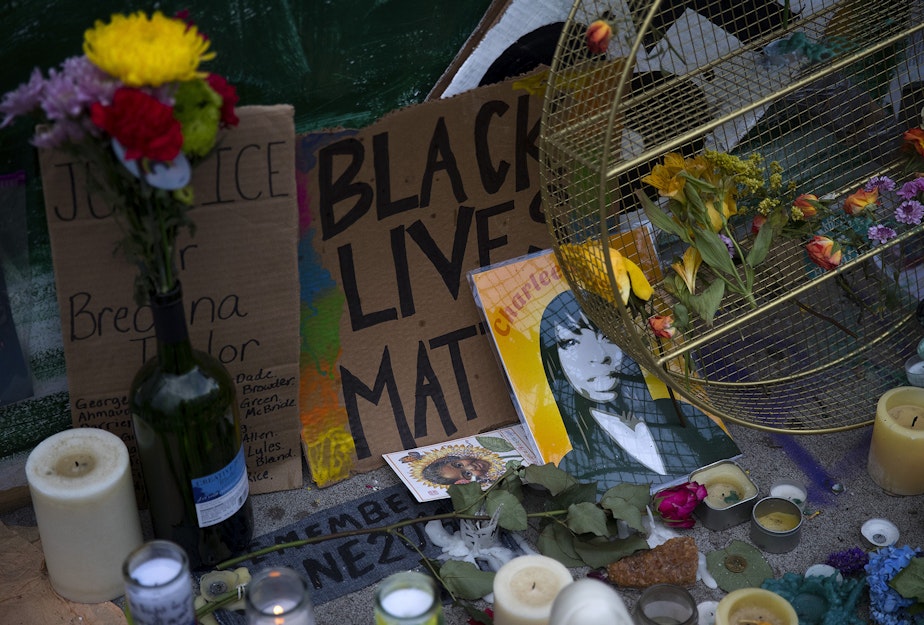Friday politics: What a Juneteenth holiday could teach everyone

June 19 could be on its way to becoming a national corporate holiday.
Juneteenth marks the day in Texas in 1865 when the last slaves in the United States finally learned of their freedom, more than two years after the Emancipation Proclamation.
So what does this mean for America's efforts moving toward greater racial justice? Political reporter Essex Porter of KIRO7 joined KUOW’s Angela King.
Angela King: What’s your reaction to the new momentum behind making Juneteenth a paid holiday?
Essex Porter: It is also very sudden. Certainly people have known about Juneteenth. Corporations have put out statements in the past. But now we see corporations making it a paid holiday. And some of those decisions have come really within the last couple of weeks or even a couple of days. So it's clearly a holiday with momentum and the kind of holiday and observance that can really help America understand where we come from and why there is so much strife today. This holiday teaches everybody about our past and how far we still have to go.
Lots of issues surrounding racism are coming to light during these times, including one new action taken by the boards of health in King and pierce counties.
Sponsored
Yes, yesterday, declaring racism a public health issue. This is not something that they just suddenly discovered. They've actually talked about this in the past as well. But they have seized this moment of attention on racial justice in America, and this attention to the pandemic, which has exposed the fractures and the inequities based on racial lines in America, to reinforce the fact that racism is a public health issue because of systemic racism. Many people of color are far more vulnerable to the pandemic than the population at large. And that's what they've done with this declaration.
This week Senator Amy Klobuchar said Joe Biden should choose a woman of color as his running mate. What do you think Biden is considering or who do you think he might be considering?
Very interesting declaration by Senator Klobuchar, really came in the midst of an interview on msnbc. So it was really quite a surprise. I think Biden will have to consider who best both energizes people of color and also, for the electorate at large, feels like someone who could step into the presidency. Many people are pressing him to select a black woman as vice presidential candidate and I think black women are now the leading choices. My top choice would be Senator Kamala Harris [of California], because you know, she has a governmental experience where people could see her in the presidency. She is an African American woman who can perhaps energize some of the Obama coalition that did not come out to vote for Hillary Clinton, which is why Hillary Clinton lost and it was a very close election in the Electoral College. So energizing those people who refuse to come out before is going to be key for Joe Biden.
Talking about energizing people ... this week the Supreme Court upheld the DACA program for young immigrants. How much pressure do you think this puts on Democrats and Republicans to deliver comprehensive immigration reform?
It puts a lot of pressure, especially, on Democrats, who have been the champions of the dreamers. Now, especially if Biden is elected president. The pressure will be to make that the number one issue for the next president and the next Congress in a way that it was not for President Obama. Now it's up to Democrats to deliver. Of course, they will need to win the presidency and may likely need to win the Senate in order to deliver on comprehensive immigration reform. But the pressure I think is more on the Democrats or the allies of those who are the Dreamers.
Sponsored
An about-face from earlier this month: Seattle Mayor Jenny Durkin now says she wants to cut the police budget. But no bill has been introduced. So how likely do you think it is that the Seattle City Council will make a 50 percent reduction to the police budget or any significant reduction at all?
Well 50 percent sounds like a lot, that may not be achievable. Some reduction is likely coming simply because Seattle, like everywhere else, is facing a huge revenue shortfall because of the pandemic. But then you have to get beyond those cuts, to see what missions the police department is doing. Now, that might be better done by some nonpolice agency. There is an element of social work in policing, where maybe it would be more effective if the person delivering that service didn't have to carry a badge or a gun. And I think that's where they'll be looking for some cuts.




